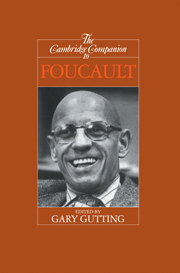Book contents
- Frontmatter
- Introduction: Michel Foucault: A user’s manual
- 1 Foucault’s mapping of history
- 2 Foucault and the history of madness
- 3 The death of man, or exhaustion of the cogito? Translated by Catherine Porter
- 4 Power/Knowledge
- 5 Ethics as ascetics: Foucault, the history of ethics, and ancient thought
- 6 The ethics of Michel Foucault
- 7 “What is enlightenment?”: Kant and Foucault
- 8 Modern and countermodern: Ethos and epoch in Heidegger and Foucault
- 9 Foucault and Habermas on the subject of reason
- 10 “Between tradition and oblivion”: Foucault, the complications of form, the literature of reason, and the aesthetics of existence
- 11 Foucault, feminism, and questions of identity
- 12 Foucault, Michel, 1926–Translated by Catherine Porter
- Bibliography
- Index
10 - “Between tradition and oblivion”: Foucault, the complications of form, the literature of reason, and the aesthetics of existence
Published online by Cambridge University Press: 28 May 2012
- Frontmatter
- Introduction: Michel Foucault: A user’s manual
- 1 Foucault’s mapping of history
- 2 Foucault and the history of madness
- 3 The death of man, or exhaustion of the cogito? Translated by Catherine Porter
- 4 Power/Knowledge
- 5 Ethics as ascetics: Foucault, the history of ethics, and ancient thought
- 6 The ethics of Michel Foucault
- 7 “What is enlightenment?”: Kant and Foucault
- 8 Modern and countermodern: Ethos and epoch in Heidegger and Foucault
- 9 Foucault and Habermas on the subject of reason
- 10 “Between tradition and oblivion”: Foucault, the complications of form, the literature of reason, and the aesthetics of existence
- 11 Foucault, feminism, and questions of identity
- 12 Foucault, Michel, 1926–Translated by Catherine Porter
- Bibliography
- Index
Summary
In a 1983 interview Michel Foucault characterized his work by connecting it with the complicated status of formalism in twentieth-century thought, claiming that the latter marked “one of the most powerful and complex forces in twentieth-century Europe” (FL, 234). Included under this rubric were a wide variety of expressions and esthetics, rational and political – all infinitely disrupting the continuities of tradition. The emergence of structuralism itself was equally aligned with this trend in an attempt to clarify its status (ibid., 235). The complicity between Michel Foucault's authorship and such formalism (like that with “structuralism,” equally itself a complex force ceaselessly claiming a mathematical base) is longstanding, and his major works attested to it from the outset (see OT, 384). It doubtless too figures Foucault's own complicity with modernism. Indeed, from the beginning to the end of his work Foucault was concerned with what he called in 1967 “the complex relations of forms” (FL, 27). Even his notorious denial of the subject for the sake of a certain authorial anonymity would not only be identified by him with the “revolutionaries” of esthetic modernism like Mallarme or Roussel but also with the discoveries of Bourbaki.
What ultimately distinguishes Michel Foucault's own commitment to formalism was doubtless its complexity: one uniting the complexity in the play between syntax and semantics, figure and constraint, discourse and event. Unlike the structuralists, who had platonized structure - and yet unlike the positivists, with whom he was, initially in any case, too often aligned — Foucault realized that were the analysis of language and language-like entities in terms of their formal properties to be carried out, the success of such projects depended upon realizing, as he had put it as early as 1967, that “discourses are unities of function” (FL, 26)
- Type
- Chapter
- Information
- The Cambridge Companion to Foucault , pp. 262 - 285Publisher: Cambridge University PressPrint publication year: 1994



